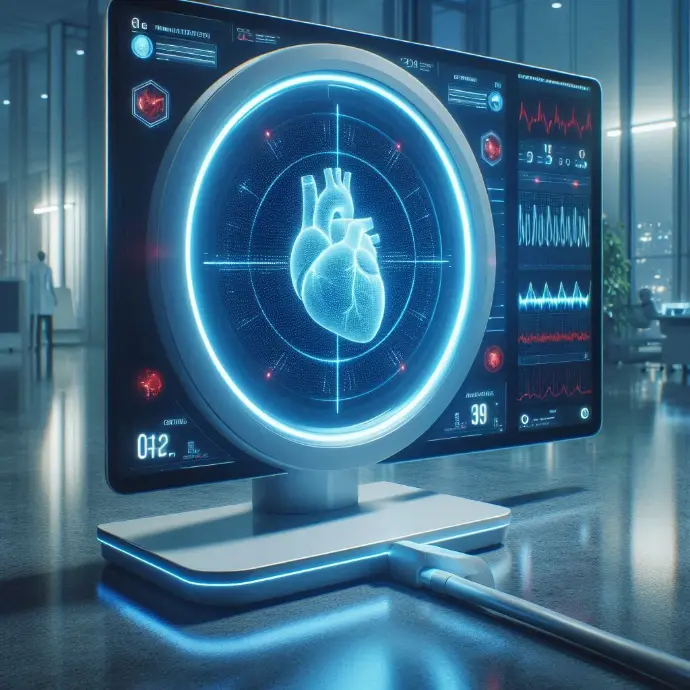Applications of Artificial Intelligence in Cardiology: Innovations in Predictive and Preventive Cardiology
In our Artificial Intelligence category, you'll discover how AI is revolutionizing medicine, particularly predictive and preventative cardiology. Get ready to delve into the fascinating world of innovations in cardiology, where technology is transforming the way we prevent and treat heart disease. Explore with us the latest trends in this exciting field and discover how AI is changing the way we care for our hearts!
Introduction
Artificial intelligence (AI) is currently revolutionizing medicine, and cardiology in particular. As this technology evolves, its impact on the prediction and prevention of heart disease is becoming increasingly significant. Below, we will explore the evolution of artificial intelligence in medicine, its impact on cardiology, and the crucial role it plays in the prediction and prevention of heart disease.
significant advancement in healthcare. From the development of deep learning algorithms to the application of AI systems in the diagnosis and treatment of diseases, medicine has undergone an unprecedented transformation.
Advances in the collection and processing of large volumes of clinical data have allowed AI systems to identify patterns, trends, and correlations that might otherwise go unnoticed. This has led to more accurate diagnoses, personalized treatments, and a better understanding of diseases.
AI has also proven invaluable in medical research, accelerating the discovery of new drugs and therapies and streamlining clinical trials. As the technology continues to evolve, its impact on medicine is expected to continue growing, bringing revolutionary advances to healthcare.
Cardiology has been one of the areas of medicine that has most experienced the positive impact of artificial intelligence. AI algorithms have proven effective in the early detection of heart disease, the interpretation of cardiac images, and the prediction of cardiovascular risks and complications.
The use of AI in electrocardiogram (ECG) interpretation has allowed for more accurate detection of arrhythmias, abnormalities, and early signs of heart disease, which in turn has improved patient prognosis and care. Furthermore, AI has significantly improved the accuracy of interpreting cardiac images, such as echocardiograms and MRIs, providing more precise and detailed diagnoses.
These technological advances have not only improved diagnostic accuracy but have also paved the way for heart disease prevention by identifying risk factors and potential complications earlier and more accurately.
Artificial intelligence plays a pivotal role in heart disease prediction and prevention by analyzing large sets of clinical and health data to identify patterns and risk factors. AI algorithms can accurately predict patients' risk of heart disease, enabling preventative interventions and a proactive approach to healthcare.
Furthermore, AI facilitates the identification of behavioral and lifestyle patterns that may influence cardiovascular health, allowing physicians and patients to take data-driven preventative measures. AI's ability to analyze and predict the progression of heart disease has also paved the way for more effective personalized treatments and prevention strategies.
Artificial intelligence is transforming cardiology by enabling more accurate prediction of heart disease, more effective prevention, and a more personalized approach to cardiovascular healthcare.

Innovations in Predictive Cardiology
Artificial intelligence (AI) has revolutionized the field of cardiology by providing significant advances in the early diagnosis of heart disease. Thanks to AI, physicians can now identify patterns and abnormalities in cardiac tests with unprecedented accuracy. This has led to an increase in the early detection of heart disease, enabling more effective interventions and improving patient survival rates. The use of machine learning algorithms in cardiac event prediction has been a milestone in predictive cardiology. These algorithms are able to analyze large amounts of data, such as test results, patient medical history, and risk factors, to accurately predict the likelihood of a cardiac event, such as a myocardial infarction or stroke. This predictive capability has allowed physicians to take preventative measures and personalize treatment to reduce the risk of cardiac events in high-risk patients. The applications of AI in personalizing cardiac treatments represent a significant advance in personalized medicine. AI analyzes genetic data, biomarkers, and other individual factors to design specific treatments tailored to each patient's needs. This has led to a more precise and effective approach to treating heart disease, improving patients' quality of life and reducing associated complications.
Emerging AI-Based Heart Monitoring Technologies
Emerging artificial intelligence (AI)-based heart monitoring technologies have revolutionized the way cardiovascular health is addressed. Thanks to advances in machine learning and the analysis of large amounts of data, it is now possible to detect patterns and abnormalities in cardiac activity more accurately and in a timely manner than ever before.
These innovations include wearable devices that use AI algorithms to continuously monitor heart rhythm, heart rate variability, and other physiological indicators. Furthermore, the integration of AI into electrocardiogram (ECG) systems has made it possible to identify early signs of heart disease and predict cardiovascular events more accurately.
Furthermore, AI has been applied in the development of diagnostic software that can analyze medical images, such as echocardiograms or MRIs, to identify structural or functional abnormalities in the heart. These emerging heart monitoring technologies not only offer earlier detection of heart problems but also enable personalized and continuous monitoring of cardiovascular health, which can lead to more effective heart disease prevention.
Challenges in Implementing AI in Predictive Cardiology
The implementation of artificial intelligence in medicine poses significant ethical challenges, especially in the field of predictive cardiology. The massive collection of cardiac health data from patients requires careful ethical interpretation to ensure that medical decision-making is based on sound principles. It is crucial that healthcare professionals and AI experts collaborate closely to develop algorithms that respect patient privacy and autonomy while providing accurate and personalized recommendations.
Ethical decision-making in AI-assisted medicine also raises fundamental questions about accountability and transparency. Clinicians must understand how recommendations from AI systems are generated and be able to justify and explain these decisions to patients. The ethics of AI in predictive cardiology is a complex issue that requires an interdisciplinary approach and careful reflection on the impact of these innovations on medical practice.
Ultimately, the ethical interpretation of data and decision-making in medicine represents a crucial challenge that must be addressed as AI continues to transform healthcare.
The Future of Predictive and Preventive Cardiology
The integration of artificial intelligence (AI) into continuous cardiac care has marked a milestone in modern medicine. With the development of advanced algorithms and the analysis of large volumes of data, AI has demonstrated its ability to predict and prevent heart conditions more effectively than ever before. The ability to constantly monitor a patient's heart data, identify patterns, and alert them to potential problems has revolutionized the way healthcare professionals approach preventive cardiology. This integration offers the possibility of detecting abnormalities early, providing the opportunity to intervene before serious problems develop.
The use of AI in continuous cardiac care not only has the potential to improve the early detection of heart disease but can also optimize treatments and reduce costs associated with healthcare. By being able to identify patterns and predict potential problems, physicians can personalize treatment and follow-up plans for each patient, which could result in a decrease in hospitalizations and long-term complications.
The combination of AI technology with cardiology medicine is paving the way for more proactive and personalized care, which promises to significantly improve the quality of life of patients with heart conditions.
The implementation of AI-based predictive cardiology is not only transforming the way heart disease is treated, but also has the potential to generate significant social and economic impacts. By preventing heart disease and reducing the need for invasive treatments, AI-based predictive cardiology can reduce the financial burden on healthcare systems, as well as on patients and their families.
Furthermore, by enabling early detection of heart problems, AI in cardiology can contribute to reducing sick leave and disabilities associated with heart disease, which in turn could have a positive impact on work productivity and people's quality of life.
On the other hand, the widespread implementation of AI-based predictive cardiology raises challenges related to equity in access to healthcare. It is critical to ensure that these innovations are available and accessible to all communities, regardless of their socioeconomic or geographic status. AI in cardiology has the potential to improve cardiovascular health worldwide, but addressing disparities in access is crucial to maximize its societal benefits.
The advancement of AI in cardiology would not be possible without interdisciplinary collaboration between healthcare professionals, data scientists, engineers, and ethics and regulatory experts. These collaborations are critical to ensuring that innovations in AI-based predictive cardiology are accurate, ethical, and aligned with best medical practices.
Furthermore, interdisciplinary collaboration fosters the integration of different perspectives and knowledge, which enriches the development of new technologies and approaches in cardiology medicine. Interdisciplinary teams can approach complex challenges from multiple angles, resulting in more comprehensive and effective solutions.
Collaboration between AI experts and healthcare professionals is also essential to ensure that the tools and algorithms developed are clinically relevant and beneficial to patients. This synergy between medicine and technology is critical to the continued advancement of AI-based predictive cardiology and its effective integration into everyday clinical practice.
Conclusions

Current Achievements and Future Prospects in the Application of AI in Cardiology
Artificial intelligence (AI) has revolutionized the way challenges in the field of cardiology are addressed. Significant advances have currently been made in the application of AI for the prediction and prevention of heart disease, saving lives and improving the quality of patient care.
Thanks to AI's ability to analyze large volumes of data quickly and accurately, previously unnoticed patterns and risk factors have been identified. This has allowed for earlier diagnosis of heart disease, which in turn has enabled the implementation of more effective preventive treatments.
In the future, AI in cardiology is expected to evolve further, enabling the development of more accurate and personalized predictive models. This means that physicians will have more advanced tools to identify and address each patient's cardiovascular risks on an individual basis, which will undoubtedly represent a major advance in preventive medicine.

 IHRO NEWS
IHRO NEWS